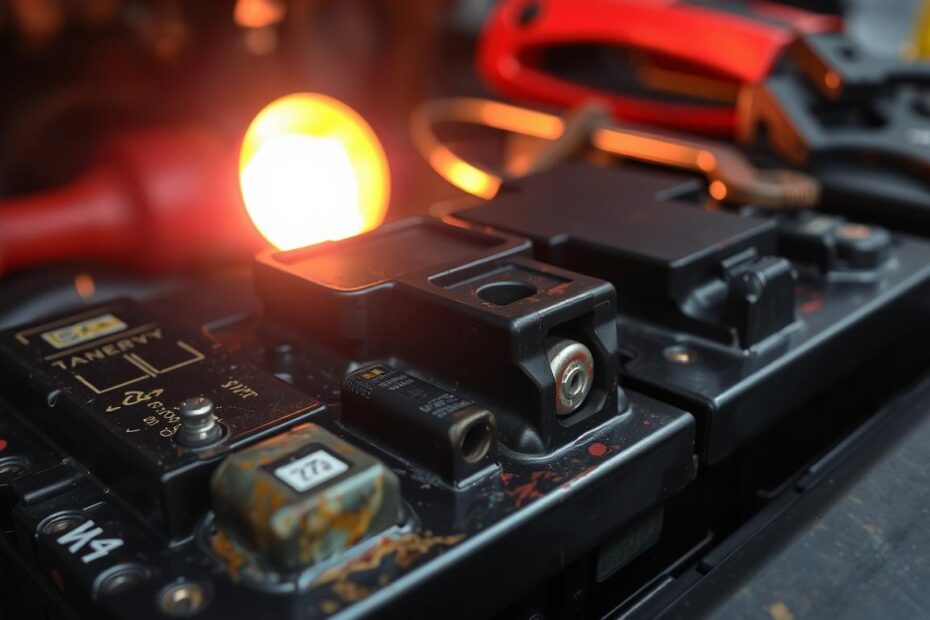As your car gets older, you might notice it’s not performing as well as it used to. This could mean your battery is failing. A dead battery can be really frustrating, but knowing the signs early can help. By spotting these signs, you can fix the problem before it gets worse.
This guide will show you the seven key signs your car battery is failing. By being aware and acting fast, you can keep your car running smoothly. This ensures your safety while driving.
Key Takeaways
- Slow engine cranking, illuminated check engine light, and electrical issues are common signs of a dying car battery.
- Batteries typically last 3-5 years, but various factors can impact their lifespan.
- Regular battery testing and maintenance can help prevent unexpected failures.
- Replacing your car battery in a timely manner is crucial for maintaining optimal vehicle performance and avoiding costly repairs.
- Understanding the warning signs and staying proactive can help you stay one step ahead of a potential battery crisis.
Understanding the Importance of Your Car Battery
Your car’s battery is a key player when the engine is off. It powers all the electrical parts and helps start the car. Knowing how your battery works can help keep it running well and last longer.
The Role of the Battery in Your Vehicle
The battery is the main power source for your car’s electrical system. It gives the voltage needed to start the engine and run other important systems. Without a good battery, your car can’t start or use its electrical systems.
Common Battery Components
- Lead-acid cells: These are the heart of the battery, storing and releasing energy through chemical reactions.
- Positive and negative plates: Made of lead, these plates help in the chemical reactions that store and release electricity.
- Electrolyte solution: A liquid made of sulfuric acid that lets the chemical reactions happen between the plates.
- Separator: A material that keeps the positive and negative plates from touching and causing short circuits.
- Casing: The outer plastic or metal part that protects the inside of the battery.
How Batteries Age
Car batteries have a limited life span. Over time, the lead plates wear down, the electrolyte solution gets used up, and the battery’s charge-holding ability decreases. Things like the weather, how you drive, and the battery’s age can affect how long it lasts. Generally, a car battery should last 3 to 5 years with good care.
“Regular battery performance tests, especially as the battery approaches the 3-year mark, are recommended to ensure optimal performance and avoid unexpected breakdowns.” – Uchaincs, a mobile mechanic company in Canada
By knowing how your car’s battery works, you can take steps to keep it healthy. This knowledge helps you spot and fix problems early. It ensures your car runs smoothly and reliably.
Sign 1: Slow Engine Crank
One common sign of a dying car battery is a slow engine crank when starting your car. Listen closely to the engine sound when you turn the key. If it sounds slow or labored, your battery might be weak.
What to Listen For
A good battery should start your engine quickly and strongly. If it takes longer or sounds slow, your battery is struggling. This is more noticeable on cold mornings when it’s harder to start the engine.
Causes of Slow Cranking
- Reduced battery capacity – As batteries age, they can’t hold a charge as well.
- Sulfation buildup – Sulfate crystals on the battery’s plates make it hard to discharge and recharge.
- Loose or corroded connections – Problems with the battery terminals or cables can slow down power flow.
If your engine cranks slowly, test your battery quickly. This will help find the problem and avoid a total battery failure.
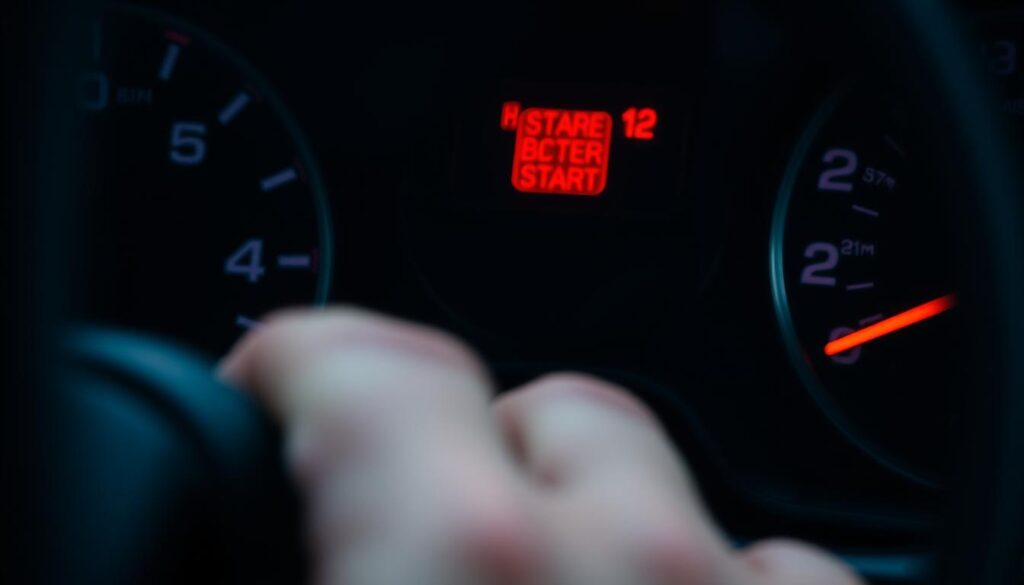
“A slow engine crank is one of the most reliable indicators that your car battery is nearing the end of its lifespan.”
Sign 2: Check Engine Light Illuminated
When your car’s check engine light or battery warning light turns on, it means something’s wrong. The car battery might be the problem. This light is a big warning to check your car’s electrical system before it gets worse.
Why the Light Matters
The check engine light tells you there’s a problem with your car’s emissions or performance. A weak or failing battery often causes this light to come on. If the battery voltage drops below 14 volts while the engine runs, the light will turn on. This means you need to check your battery and possibly replace it.
Additional Warning Lights to Watch
- Battery or charging system warning light: This light specifically indicates an issue with your car’s charging system or the battery itself.
- Dimming headlights or dashboard lights: If your vehicle’s lights begin to flicker or dim, it could be a sign of a weak or dying battery.
- Electrical system malfunctions: Problems with other electrical components, such as the radio, climate controls, or even the engine, can point to a battery-related issue.
If you see any of these warning signs, get your car checked by a mechanic. They can look at your electrical system and battery. Fixing problems early can save you money and keep your car running well.
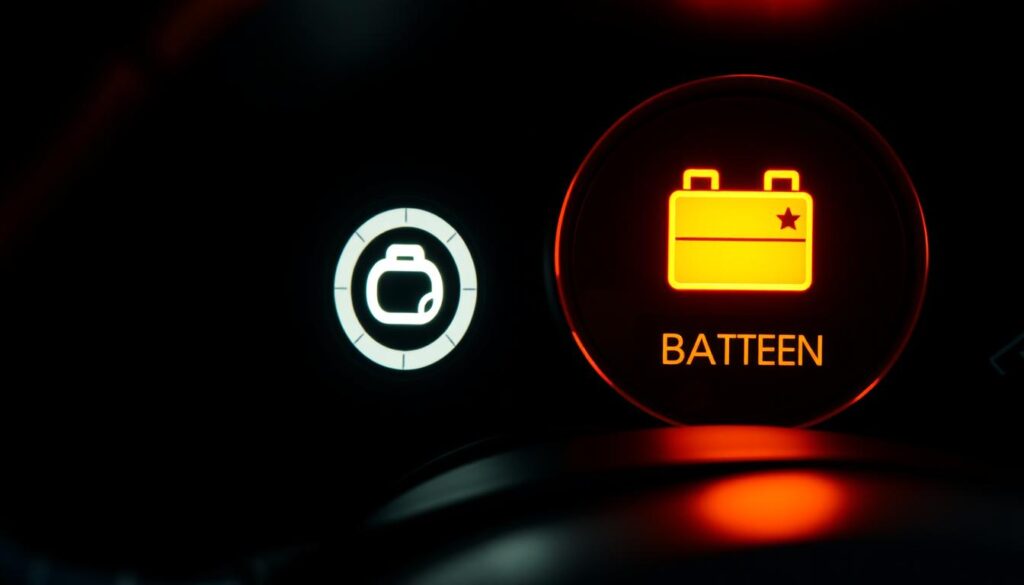
| Warning Light | Potential Causes | Recommended Action |
|---|---|---|
| Check Engine Light | Dropping battery voltage, electrical system issues | Have the battery and charging system tested, replace if necessary |
| Battery/Charging System Warning Light | Faulty alternator, loose or corroded battery connections | Inspect battery and alternator, repair or replace as needed |
| Dimming Lights | Weak or failing battery, loose connections | Test battery and connections, replace battery if necessary |
Sign 3: Swollen or Leaking Battery Case
A swollen or leaking battery case is a clear sign your car’s battery is almost out. A damaged case can mean the battery is overheating or overcharging. It’s important to fix this quickly to avoid more damage to your car.
Visual Signs of Battery Damage
Check your car’s battery often for damage signs. Look for a bulging or cracked case, visible leaks, and corrosive buildup around the terminals. These signs mean the battery is damaged and might need to be replaced.
Potential Risks of a Damaged Battery
- Trying to start the engine with a weak battery can harm the starter motor, leading to costly repairs.
- A leaking battery can cause corrosion and damage to other parts of your car’s electrical system.
- A swollen or cracked battery case can be dangerous, posing a fire risk to your safety.
If you see any damage signs on your battery, get your car checked by a pro right away. This will prevent more problems and keep you safe on the road.
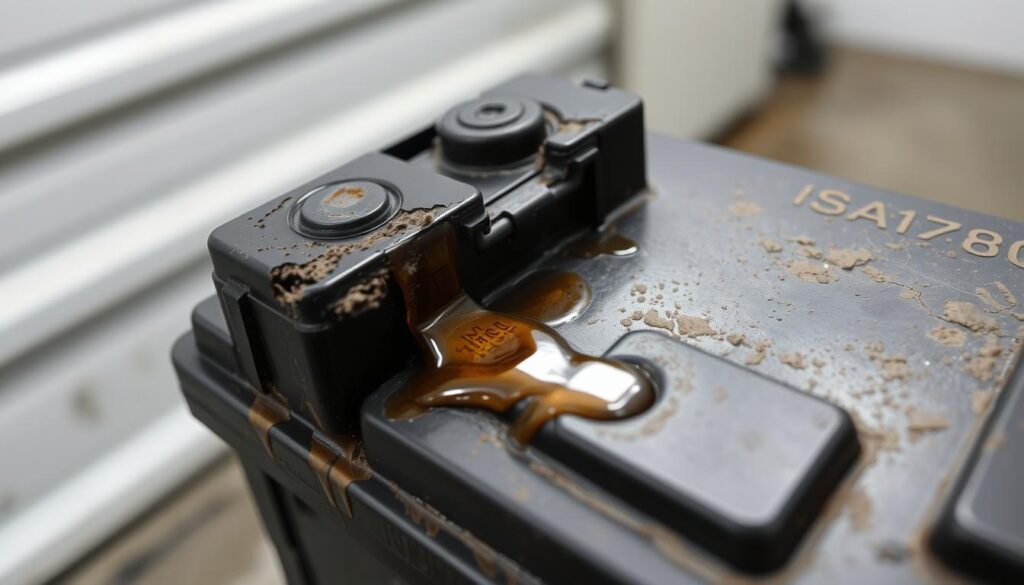
Sign 4: Electrical Issues and Flickering Lights
One clear sign your car battery is failing is flickering headlights. If your headlights dim or flicker, especially right after turning them on with the engine off, it’s a warning sign. This could mean your battery is weakening.
Other signs include glitchy electronics, hesitating power windows, or forgotten Bluetooth settings. These issues happen because a dying battery can’t power your car’s electrical parts well.
Identifying Electrical Irregularities
Watch your car’s electrical system closely. Look out for flickering lights, unresponsive electronics, and power issues. These signs mean your battery is struggling to meet your car’s needs.
How a Weakening Battery Affects Lights
- Dim or flickering headlights, especially when the engine is off, can indicate a battery that’s nearing the end of its lifespan.
- Interior lights that dim or flicker can also be a symptom of a weak battery, as it struggles to maintain a consistent power supply.
- If you notice your car’s electronics acting up, such as glitchy touchscreens or unresponsive power windows, it’s another sign that your battery may need to be replaced.

Stay alert and fix electrical problems quickly to avoid bigger issues. If you see these signs, it’s time to test and possibly replace your battery. This will keep your car running smoothly and prevent breakdowns.
Sign 5: Bad Odors from the Battery
A bad smell from your car battery is a clear sign it’s about to fail. The smell is often like sulfur or rotten eggs. It means your battery needs help right away.
Recognizing Sulfur or Rotten Egg Smells
A damaged or leaking car battery smells bad. It smells like sulfur or rotten eggs. This smell means your battery is having problems.
Why Odors Indicate Trouble
The smell comes from hydrogen sulfide gas. This gas is a sign of a bad battery. It’s dangerous to breathe in and means your battery needs to be replaced fast.
Not fixing the smell can lead to big problems. A bad battery can damage other parts and even stop your car’s electrical system. Fixing it quickly keeps your car running well.

“A bad car battery can cause a range of issues, from slow starting to complete electrical failure. Don’t ignore that sulfur smell – it’s a clear sign that your battery needs attention.”
Sign 6: Dashboard Warning Indicators
Your car’s dashboard has many warning lights. They alert you to battery problems. These lights help you keep your car in good shape and fix issues early.
Key Warning Lights to Monitor
Watch these dashboard warning lights closely:
- Battery icon or “Charge” light: This light shows a problem with charging or the battery.
- Check Engine light: It can mean many things, but also a weak or failing battery.
- Voltage warning light: This light goes on when the battery’s voltage is off, meaning a bad alternator or battery.
Following Manufacturer Guidelines
Check your car’s manual for each light’s meaning and what to do. Paying attention to these lights and fixing problems fast can prevent a dead battery. It keeps your car’s systems working well.
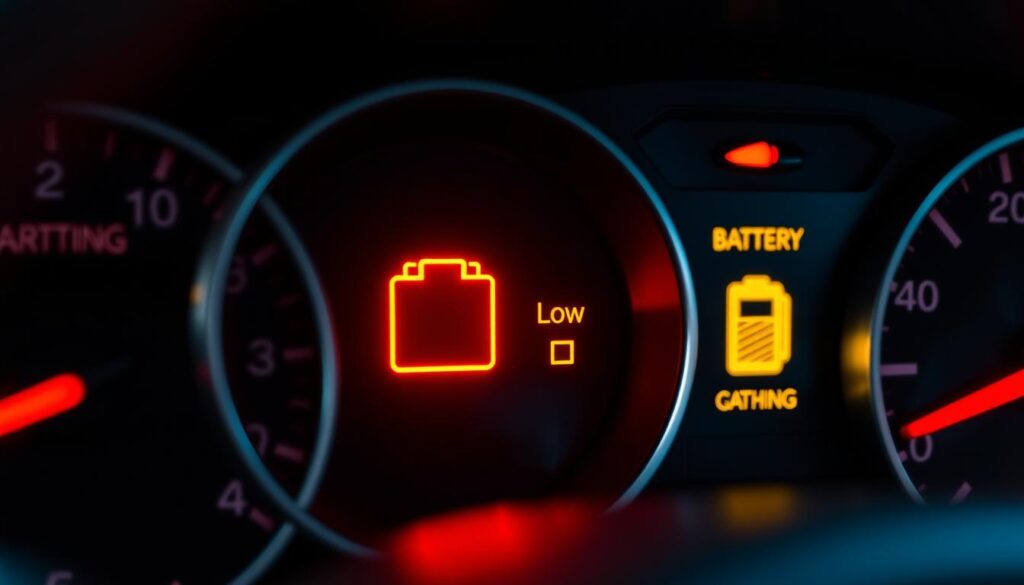
Regular battery checks and replacing it when needed are key. They keep your car’s electrical system healthy and avoid sudden breakdowns.
Sign 7: Age of the Battery
It’s important to watch your car battery’s health as it ages. Car batteries usually last 3 to 5 years. But, this can change based on the weather, how you drive, and the car’s electrical needs.
Typical Lifespan of a Car Battery
A new car battery can last up to six years in perfect conditions. But, most last about 4 years. Extreme weather, short trips, and high electrical use can make it need replacing sooner.
Factors that Influence Battery Longevity
- Climate: Driving in cold or hot climates, such as Manitoba’s harsh winters, can take a toll on the battery’s performance and lifespan.
- Driving Habits: Frequent short trips, leaving lights or electronics on, and other behaviors that place a high electrical demand on the battery can reduce its lifespan.
- Battery Age: As a battery gets older, typically after 2-3 years, it becomes more susceptible to failure and should be tested regularly.
It’s key to test your battery regularly, especially if it’s over 2 years old. This ensures your car’s electrical system works right and spots any problems early.
| Battery Age | Typical Lifespan | Replacement Recommendation |
|---|---|---|
| 0-2 years | 4-6 years | Monitor battery condition, test annually |
| 2-4 years | 2-4 years | Test battery every 6 months, replace as needed |
| 4+ years | 1-3 years | Replace battery as soon as possible |

Knowing how long a car battery lasts and what affects it can help you plan for a replacement. This way, you can avoid sudden breakdowns.
Tips for Maintaining Your Car Battery
Keeping your car’s battery in good shape is key for reliable performance and avoiding breakdowns. By following simple car battery maintenance tips, you can extend your battery’s life and avoid expensive replacements. Let’s look at the basics of car battery care.
Routine Checks and Care
Regularly checking your car battery can help spot problems early. Spend a few minutes looking at the battery terminals and connections. Ensure the terminals are clean and connections are tight. If you see white, powdery buildup, clean the terminals with a wire brush or baking soda solution.
Testing your battery’s voltage with a multimeter is also wise. A healthy battery should read around 12.6 volts when the car is off. A lower reading might mean your battery is getting old.
When to Seek Professional Help
While you can do basic car battery maintenance at home, seek professional help for warning signs. A skilled mechanic can do a detailed battery test and advise on the next steps, whether it’s cleaning or replacing the battery.
It’s wise to have your car battery tested during routine maintenance, especially if it’s over 3 years old. Early care can prevent unexpected breakdowns and keep your vehicle ready to go.
| Maintenance Tip | Importance |
|---|---|
| Visual Inspection | Catch issues early and clean terminals |
| Voltage Testing | Identify weakening batteries before failure |
| Professional Assistance | Comprehensive testing and replacement advice |
“Regular car battery maintenance is a small investment that can save you from the headache of a dead battery and the hassle of a roadside breakdown.”
When to Replace Your Battery
Keeping your car’s battery in top shape is key for reliable performance. It helps avoid unexpected breakdowns. But, how do you know when it’s time to replace your car battery? Here are some guidelines to help you decide:
Guidelines for Making the Decision
There are a few key signs that indicate it’s time to replace your car battery:
- Your battery can’t hold a charge after being recharged.
- The battery case looks swollen or is leaking, which could mean internal damage.
- Your battery is over 5 years old, as they usually last 3-5 years.
Importance of Timely Replacement
Replacing your car battery at the first sign of trouble is crucial. A weak or failing battery can cause starting issues, electrical problems, and damage to other parts in your car’s electrical system. By acting quickly and replacing the battery when to replace car battery, you can avoid unexpected breakdowns and expensive repairs later.
Don’t wait until your battery dies completely to take action. Regularly check your battery’s condition and replace it as needed. This ensures your car starts and runs reliably, no matter the weather or driving conditions.
Choosing the Right Replacement Battery
When it’s time to replace your car’s battery, picking the right one is key. Consider your car’s specs, the local climate, and how you drive. These factors are important.
Factors to Consider
First, check your owner’s manual or talk to a mechanic to find out what battery your car needs. Look for the battery’s size, Cold Cranking Amps (CCA) rating, and voltage. These details are crucial.
Also, think about the weather in your area. Hot weather can cause batteries to lose water and corrode. Cold weather slows down the battery’s chemical reactions, shortening its life. A battery made for your local weather will perform better and last longer.
How you drive also matters. If you take short trips or have lots of car accessories, you’ll need a battery with a higher CCA rating. This ensures it can handle the extra power needs.
Trusted Brands and Models
When picking a new car battery, choose well-known battery brands like Interstate Batteries. They offer reliable batteries with good warranties. These brands are known for making high-quality batteries that meet daily driving needs.
Compare different options to find the best battery for your car. This ensures your new battery will provide the power and longevity your car needs. It will keep your car running smoothly for years.
Remember, taking care of your car’s battery and replacing it on time can prevent breakdowns and expensive repairs. By choosing the right battery, you’ll have peace of mind and a more reliable car.
Conclusion
Keeping your car battery healthy is key for smooth driving. Watch out for seven warning signs like slow engine start and bad odors. These signs can help you fix problems before they get worse.
Recap of signs and maintenance tips
Regular checks and cleaning can make your battery last longer. Most batteries last 3 to 5 years. Fixing issues like corrosion and overcharging can prevent sudden failures.
Encouragement for proactive vehicle care
Looking after your car battery health and preventive maintenance makes driving better. Pay attention to your car’s performance. Get your battery checked or replaced if needed. A good battery is essential for a well-running car.
FAQ
What are the key signs that my car battery is about to die?
Look out for slow engine crank, an illuminated check engine light, and a swollen or leaking battery case. Also, watch for flickering lights, bad odors, and dashboard warning indicators. These signs mean it’s time to replace the battery before it fails.
How long do car batteries typically last?
Car batteries usually last 3-5 years. This depends on how much you use it, the temperature, and the electrical demand. It’s important to test and maintain the battery, especially after 2 years.
What should I do if I notice a slow engine crank when starting my car?
A slow engine crank means your battery is weakening. It’s struggling to start the engine efficiently. This is a sign that you need to replace the battery soon.
Why is it important to pay attention to the check engine light or battery warning light?
These lights can show battery or electrical system problems. If they light up, get your car checked by a pro. This can prevent bigger issues.
What should I do if I notice a swollen or leaking battery case?
A damaged battery case can leak acid, harming your car. If you see swelling, cracks, or leaks, replace the battery fast. This will avoid more damage.
How can I tell if my car’s electrical issues are related to a weak battery?
Look for flickering headlights, glitchy electronics, and problems with power windows or Bluetooth. These signs mean your battery is weak. Fix these issues quickly to avoid bigger problems.
What does it mean if I notice a sulfuric or rotten egg smell coming from the battery area?
A strong, bad smell from the battery area is a serious warning. It means the battery might be damaged or leaking. Deal with this right away to avoid more damage and safety risks.
How can I monitor my car’s battery health through the dashboard indicators?
Watch the battery icon, check engine light, and any voltage warnings on your dashboard. Check your owner’s manual to understand these indicators. It will tell you what to do next.
When should I consider replacing my car’s battery?
Replace your car’s battery every 3-5 years, or sooner if you see warning signs. Look for slow cranking, electrical issues, or if the battery can’t hold a charge. Replacing it on time can prevent breakdowns and damage to other parts.
What should I look for when selecting a replacement battery for my car?
Choose a battery that fits your car’s specs, the local climate, and your driving habits. Pick a reputable brand with good performance and warranty. Make sure the new battery meets your car’s Cold Cranking Amps (CCA) rating.
Source Links
- How to Tell If Your Car Battery Is Dead or Dying
- How to Tell if Your Car Battery Should be Charged or Replaced
- 7 Signs Your Vehicles Needs a New Battery
- Learn when to replace a car battery
- Car Battery: 8 Signs Your Battery Needs to be Replaced – Uchanics: Auto Repair
- Sturtevant Auto Salvage
- 7 Signs Your Car Battery Needs Replacement – Bateriku
- 8 Signs Your Car Battery Is Dying (& What to Do Next)
- Tips, Guides & Resources For Keeping Your Car Up & Running In Jacksonville FL
- 5 Signs Your Car Battery Needs to be Replaced | Hollenshade’s
- Signs That Your Car Needs Battery Change | Car Battery Change signs
- Signs Your Car Battery Needs Replacement Immediately – Crossroads Helpline
- The Silent Killer: 7 Warning Signs Your Car Battery Needs Replacing
- 7 Signs Your Car’s Battery Needs To Be Changed – The Auto Doc
- Car Battery Signs Of Dying: 7 Sings | B&W Garge
- 10 Signs You Need to Change Your Car Battery
- Signs Your Car Battery is Almost Dead
- 7 Signs Your Vehicle Needs a New Car Battery – Haasz Automall, LLC Blog
- 8 Dying Car Battery Warning Signs You Shouldn’t Ignore
- Top 10 Signs Your Car Battery Needs Replacement | Expert Advice
- 7 Signs When It’s Time For A New Car Battery (Recommended)
- How to Test & When to Replace a Dead Car Battery
- How to Know When to Replace a Car Battery
- 7 Signs You Should Get a New Car Battery – Evans Tire & Service Centers
- 7 Signs Your Car Battery Needs Replacement: Don’t Get Stuck!
